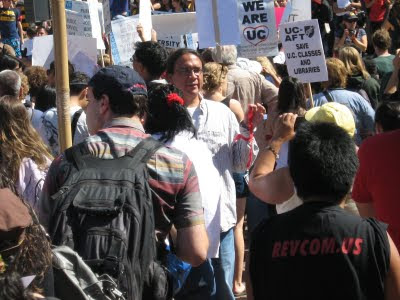




I, like many others, tweeted the noon rally on Sproul (#ucwalkout). Aaron has great pictures here.
(Someone else's great Flickr set.)
(Media.)





“If we teach standardized, handbook grammar as if it is the only ‘correct’ form of grammar, we are teaching in cooperation with a discriminatory power system” (Patricia A. Dunn and Kenneth Lindblom, English Journal, January, 2003).Of course, Dunn and Lindblom are completely correct when it comes to imputing moral value to different sociolects. You'll get no argument from me there.
Statements like this one issue from the mistake of importing a sociological/political analysis of a craft into the teaching of it. It may be true that the standard language is an instrument of power and a device for protecting the status quo, but that very truth is a reason for teaching it to students who are being prepared for entry into the world as it now is rather than the world as it might be in some utopian imagination — all dialects equal, all habit of speech and writing equally rewarded.
I have devised a number of exercises designed to reinforce and extend the basic insight. These include (1) asking students to make a sentence out of a random list of words, and then explain what they did; (2) asking students to turn a three-word sentence like “Jane likes cake” into a 100-word sentence without losing control of the basic structure and then explain, word-by-word, clause-by-clause, what they did; (3) asking students to replace the nonsense words in the first stanza of Lewis Carroll’s “Jabberwocky” with ordinary English words in a way that makes coherent (if silly) sense, and then explain what they did, and how they knew what kind of word to put into each “slot.” (The answer is that even in the absence of sense or content, the stanza’s formal structure tells them what to do and what not to do.)"Jabberwocky," by the way, is God's gift to teaching. I used it in a History of the English Language lecture last year. I can't tell you how my heart swelled with delight when a student proposed, based on the stem vowel, that "outgrabe" was a past-tense strong verb.
Notice that the exercises always come in two parts. In the first part students are asked to do something they can do easily. In the second part they are asked to analyze their own performance. The second part is the hard one; it requires students to raise to a level of analytical conscience the operations they must perform if they are to write sentences that hang together.
Looked at prosaically, public Zotero libraries may be the equivalent of a give-a-penny, take-a-penny bowl at a local store. This convenience alone would be useful, but the creators of Zotero are much more inspired than that. They know that sharing a library is crowdsourcing a library. The more people who know what we’re researching before we’re done with the research, the better. Better for the researchers, better for the research. Collaboration begins at the source, literally.I wouldn't quite say I've drunk the crowdsourcing Kool-Aid yet, but I agree with Sample's subtext, that cultural shifts are needed to make the humanities more collaboration-friendly, and opening up your Zotero library is one step in that direction.
As someone who has worked for the University of California for 13 years, I can say without reservation I LOVE this university and have chosen to work here, turning down offers to work other places. I believe deeply in our public mission, and the twin values of access and excellence that are central to our goals. I am proud to work for a campus of the UC that is ranked by many as the number one public university in America. I am especially proud and honored to have the opportunity to teach our extraordinary graduate students here at Berkeley, and I know for many of them, Berkeley’s twin values of access and excellence are the main reason they chose us over other institutions. I deeply value the fact that our undergrad student body is remarkably diverse. Berkeley has more students on Pell grants (government grants that fund students with the least economic resources) than all the Ivy League schools put together. Many of my undergrad students are the first in their families to get a higher education. Many of them are working, sometimes even full time, to put themselves through college. They approach our exchange together in the classroom as a privilege rather than an entitlement, and it is MY privilege to teach them because they are so committed, bright, and curious. I went into university teaching because of the ideals and values that guide my encounters with students every day. I did not choose this job for the money. I am distressed and deeply concerned that administrators at the top level of the University of California are using the present budget crises of the University of California to fundamentally alter the focus and mission of the university in ways that are instrumentalist and utilitarian, and show little respect for the role of the liberal arts in producing effective and thoughtful citizens.